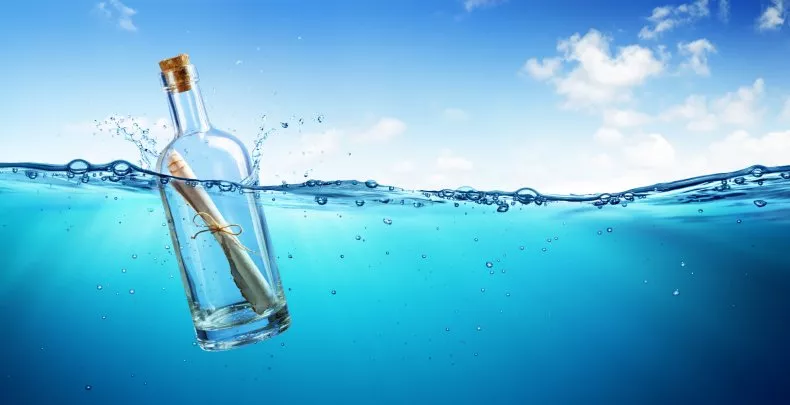A Sea Waif
We all dream of finding a bottle containing a message sent by some forlorn sailor stuck on a desert island, in the form of a love letter or telling of some great event. Many of us have sent messages in bottles, and as often received no reply.
The discovery of one such message was reported in the Adelaide Express and Telegraph of October 1874:
WAIF FROM THE OCEAN.
We are favoured with the perusal of one of those messages occasionally committed to the mighty deep, to be picked up on a far-off shore, and tell perhaps of the fate of some goodly vessel, or merely to throw light upon the course of the ocean currents, or gratify a harmless fancy for sending a friendly communication by such a medium. In this case Mr. Benjamin Denoing, of Denington, near Robe, picked up as bottle on the 9th instant on the coast, about eight miles east of Guichen Bay, containing the following letter, which he asks us to forward to its destination, a request that will be complied with.
“To Messrs. F. Green and Company, 140. Leadenhall-street, London. This leaves the Malabar, from Cardiff to Bombay, 54 days out, all well. Have had very strong gales from W.N.E. the last fortnight, and very high seas, evidently bad weather to the southward and westward of us. Kept to the northward to avoid it, and to-day got into finer weather. Wind still strong at W.N.W. with heavy seas, but weather finer and glasses higher. Bar. 29.75, steering E.N.E.
“Please sent this to Lloyd’s Agents, and oblige,
“Yours sincerely,
“CHARLES DOUGLAS, Master Malabar. 39.00 S.; 25.00 East, 12th Dec., 1872.”
It will be seen by this that the bottle was thrown overboard a little east, and about four degrees south of the Cape of Good Hope, but how long it was in reaching the spot where it was picked up it is of course impossible to say. The paper is in a good state of preservation, though a little stained, as if it had been put into a wet bottle, or the cork had become leaky.
Express and Telegraph (Adelaide) Monday 12th October 1874
The Malabar, one of Green’s Blackwall Frigates (1860-1882) had sailed from the Downs bound for Bombay two years earlier.
Several other contemporary Australian newspapers covered the same story over the next few days, and in due course, about three months later, it was picked up by the English papers after the letter had been forwarded to F. Green & Co., in London – the ship’s owners/managers.
CURIOUS MESSAGE FROM THE SEA.
The following letter appeared in The Times of Saturday: – On the 31st December, we received from the editor of the Advertiser newspaper, Adelaide, a letter which was picked up in a bottle about eight miles east of Guichon Bay, near Adelaide, on the 9th of October last. This letter had been placed in the bottle and cast to the mercy of the waves by Captain Douglas, commander of Messrs. Green’s ship Malabar, from that vessel on the 12th of December, 1872, in lat. 39 south, long. 25 east. As Guichon Bay is in about 36.30 south lat., 140 long. east, and in that parallel of latitude the degrees of longitude may be estimated at about 45 miles, the bottle must have travelled about 5200 miles; or, presuming it had not long remained on the coast undiscovered, have made the voyage at the rate of about eight miles per day. We send your these particulars thinking they may prove of interest to many of your readers. The Malabar was at the time mentioned on a voyage to Bombay, and has just now arrived at Melbourne. – F. GREEN AND Co.
Sheffield Independent, Monday 4th January 1875
No copy of the letter found in the bottle was published with this account. After dropping the bottle, the Malabar completed her trip to Bombay successfully.
It is not clear from the message why Captain Douglas felt the need to report his position by bottle given that the weather was improving and he was steering in the desired direction for the Indian Ocean. They certainly did not sound to be in major distress.
After making other voyages, the Malabar arrived in Port Philip in Australia on 20th December 1874 after a voyage of 99 days, 69 days after the newspaper report about a completely different voyage.

